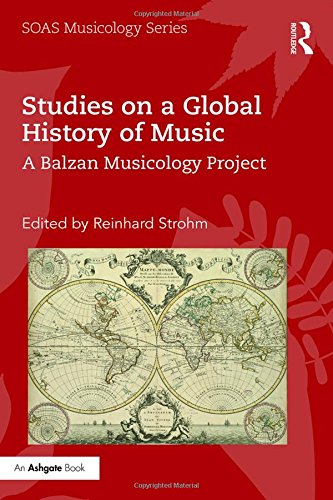

Most ebook files are in PDF format, so you can easily read them using various software such as Foxit Reader or directly on the Google Chrome browser.
Some ebook files are released by publishers in other formats such as .awz, .mobi, .epub, .fb2, etc. You may need to install specific software to read these formats on mobile/PC, such as Calibre.
Please read the tutorial at this link. https://ebooknice.com/page/post?id=faq
We offer FREE conversion to the popular formats you request; however, this may take some time. Therefore, right after payment, please email us, and we will try to provide the service as quickly as possible.
For some exceptional file formats or broken links (if any), please refrain from opening any disputes. Instead, email us first, and we will try to assist within a maximum of 6 hours.
EbookNice Team

Status:
Available4.6
34 reviewsThe idea of a global history of music may be traced back to the Enlightenment, and today, the question of a conceptual framework for a history of music that pays due attention to global relationships in music is often raised. But how might a historical interpretation of those relationships proceed? How should it position, or justify, itself? What would 'Western music' look like in an account of music history that aspires to be truly global?
The studies presented in this volume aim to promote post-European historical thinking. They are based on the idea that a global history of music cannot be one single, hegemonic history. They rather explore the paradigms and terminologies that might describe a history of many different voices. The chapters address historical practices and interpretations of music in different parts of the world, from Japan to Argentina and from Mexico to India. Many of these narratives are about relations between these cultures and the Western tradition; several also consider socio-political and historical circumstances that have affected music in the various regions. The book addresses aspects that Western musical historiography has tended to neglect even when looking at its own culture: performance, dance, nostalgia, topicality, enlightenment, the relationships between traditional, classical, and pop musics, and the regards croisés between European, Asian, or Latin American interpretations of each other’s musical traditions.
These studies have been derived from the Balzan Musicology Project Towards a Global History of Music (2013–2016), which was funded by the International Balzan Foundation through the award of the Balzan Prize in Musicology to the editor, and designed by music historians and ethnomusicologists together. A global history of music may never be written in its entirety, but will rather be realised through interaction, practice, and discussion, in all parts of the world.